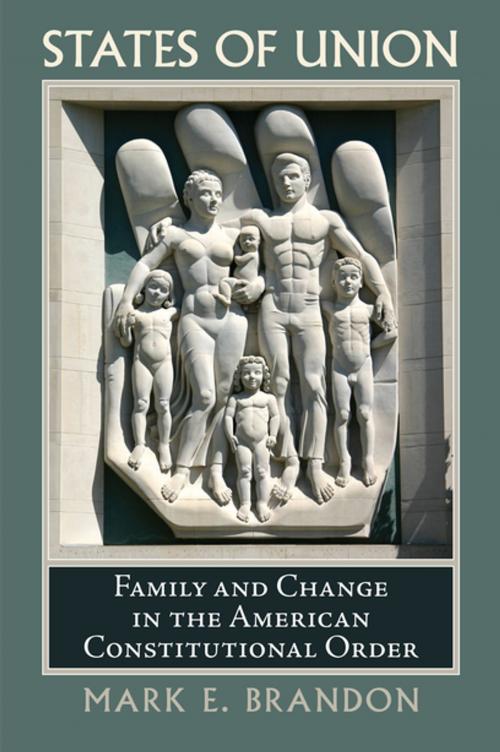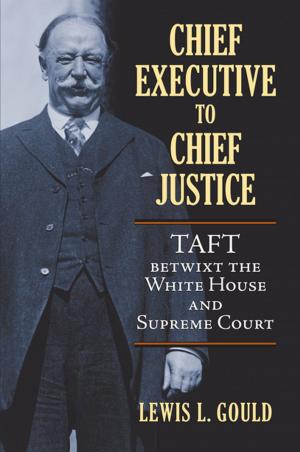States of Union
Family and Change in the American Constitutional Order
Nonfiction, Reference & Language, Law, Legal History, Constitutional, History| Author: | Mark E. Brandon | ISBN: | 9780700619764 |
| Publisher: | University Press of Kansas | Publication: | April 11, 2014 |
| Imprint: | University Press of Kansas | Language: | English |
| Author: | Mark E. Brandon |
| ISBN: | 9780700619764 |
| Publisher: | University Press of Kansas |
| Publication: | April 11, 2014 |
| Imprint: | University Press of Kansas |
| Language: | English |
Silver Gavel Award Finalist
In two canonical decisions of the 1920s—Meyer v. Nebraska and Pierce v. Society of Sisters—the Supreme Court announced that family (including certain relations within it) was an institution falling under the Constitution's protective umbrella. Since then, proponents of "family values" have claimed that a timeless form of family—nuclear and biological—is crucial to the constitutional order. Mark Brandon's new book, however, challenges these claims.
Brandon addresses debates currently roiling America—the regulation of procreation, the roles of women, the education of children, divorce, sexuality, and the meanings of marriage. He also takes on claims of scholars who attribute modern change in family law to mid-twentieth-century Supreme Court decisions upholding privacy. He shows that the "constitutional" law of family has much deeper roots.
Offering glimpses into American households across time, Brandon looks at the legal and constitutional norms that have aimed to govern those households and the lives within them. He argues that, well prior to the 1960s, the nature of families in America had been continually changing—especially during western expansion, but also in the founding era. He further contends that the monogamous nuclear family was codified only at the end of the nineteenth century as a response to Mormon polygamy, communal experiments, and Native American households.
Brandon discusses the evolution of familial jurisprudence as applied to disputes over property, inheritance, work, reproduction, the status of women and children, the regulation of sex, and the legal limits to and constitutional significance of marriage. He shows how the Supreme Court's famous decisions in the latter part of the twentieth century were largely responses to societal change, and he cites a wide range of cases that offer fresh insight into the ways the legal system responded to various forms of family life.
More than a historical overview, the book also considers the development of same-sex marriage as a political and legal issue in our time. States of Union is a groundbreaking volume that explains how family came to be "in" the Constitution, what it has meant for family to be constitutionally significant, and what the implications of that significance are for the constitutional order and for families.
Silver Gavel Award Finalist
In two canonical decisions of the 1920s—Meyer v. Nebraska and Pierce v. Society of Sisters—the Supreme Court announced that family (including certain relations within it) was an institution falling under the Constitution's protective umbrella. Since then, proponents of "family values" have claimed that a timeless form of family—nuclear and biological—is crucial to the constitutional order. Mark Brandon's new book, however, challenges these claims.
Brandon addresses debates currently roiling America—the regulation of procreation, the roles of women, the education of children, divorce, sexuality, and the meanings of marriage. He also takes on claims of scholars who attribute modern change in family law to mid-twentieth-century Supreme Court decisions upholding privacy. He shows that the "constitutional" law of family has much deeper roots.
Offering glimpses into American households across time, Brandon looks at the legal and constitutional norms that have aimed to govern those households and the lives within them. He argues that, well prior to the 1960s, the nature of families in America had been continually changing—especially during western expansion, but also in the founding era. He further contends that the monogamous nuclear family was codified only at the end of the nineteenth century as a response to Mormon polygamy, communal experiments, and Native American households.
Brandon discusses the evolution of familial jurisprudence as applied to disputes over property, inheritance, work, reproduction, the status of women and children, the regulation of sex, and the legal limits to and constitutional significance of marriage. He shows how the Supreme Court's famous decisions in the latter part of the twentieth century were largely responses to societal change, and he cites a wide range of cases that offer fresh insight into the ways the legal system responded to various forms of family life.
More than a historical overview, the book also considers the development of same-sex marriage as a political and legal issue in our time. States of Union is a groundbreaking volume that explains how family came to be "in" the Constitution, what it has meant for family to be constitutionally significant, and what the implications of that significance are for the constitutional order and for families.















